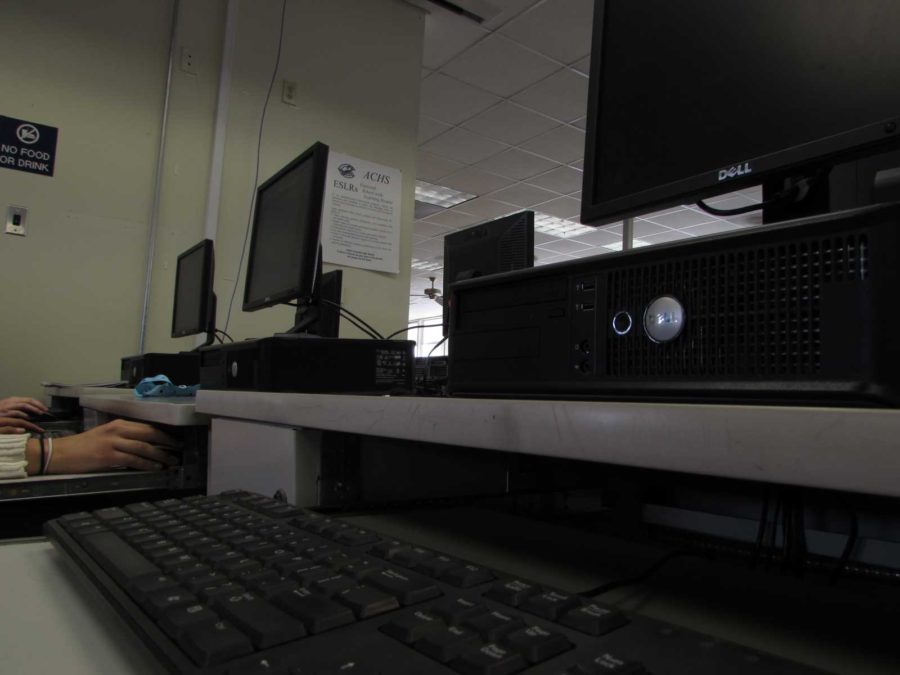Backing out of the SBAC
Juniors across the nation took the SBAC entirely on computers, a sharp contrast from the pen-and-paper methods of the STAR.
Twenty-one Cam High juniors opted out of taking the Smarter Balanced Assessment Consortium (SBAC), four of them due to special education circumstances.
The SBAC is a computer-administered exam revolving around mathematics and English-Language Arts, designed to test the latest set of standards adopted by California as defined by Common Core.
Unlike most large-scale standardized testing, the SBAC is not entirely multiple choice but also features short and long answer components, as well as interactive graphs in the mathematics section. Exam materials given to every student taking the SBAC included scratch paper, a pencil, and small headphones to use during the test’s audio presentations. Most Cam High juniors completed the exam between April 20 and May 25, though the test itself has no time limit.
“It’s a new accountability system that’s meant to help inform and guide students,” said Dr. Kim Stephenson, assistant principal. Stephenson, who is of the opinion that the SBAC is better than the previously used STAR test, believes that the test ran smoothly with the help of school IT (information technology), Mr. Charles Tapee’s troubleshooting, and the management of testing rooms by various teachers.
Now that the first year of officially administering the SBAC is over, Stephenson aims for an even better testing environment next year. “We’ll get use to it. Some tools were tricky. I did four days of practice myself, but I think as we go further through the process, this can even count towards placing students in classes their senior year,” she said. “When the students get to see how well they did on their tests, they will feel a real sense of accomplishment.”
For both the mathematics and language arts portion of the test, students were given five days on average of preparation for the SBAC which consisted of a class activity, a performance task, and a practice computer adaptive test. Despite the mandatory preparation by the school, some students decided they did not want to take the test.
Some students that opted out were gone on HHT (home and hospital teaching), while others opted out because they didn’t agree with the tests themselves. Approximately 70 percent of Calabasas High School juniors and forty percent of Westmoor High School juniors in Daly City also decided not to take the SBAC, according to an article by EdSource.
Junior Stefanie Chordigian was one of those that opted out due to a disagreement with the testing principles. “The Common Core isn’t efficient because it doesn’t count for anything yet,” said. “It’s not a good method of teaching, and my dad agrees. I printed out the permission slip online to get out of it, and my dad readily agreed to sign me out. It’s just one more test we’re forced to do.”
Sarah Gay, junior, instead chose to take the test all the way through but agreed that the exercises were tedious. “The process that was supposed to prepare me definitely seemed to be little to no help whatsoever,” she said. “There were awkward lessons that were haphazardly thrown into teacher’s curricula.”
Another junior, Daniel Morales, opted out because he had more important obligations which fell on the same days. “I had a couple questions about the test because I was also busy studying for my CAHSEE and for my SATs. I went to the office, and I guess they weren’t allowed to tell me anything about it other than it counts towards college,” he said. “I did some research and found out they are still working out bugs in the system. I took the first day of SBAC and completed maybe a fourth of it and decided it wasn’t worth it. I have other things to worry about. […] I had my parents call in to get me out of it.”
Morales also said there were technical issues with the test. “There were problems with computers crashing, too,” he said. “I think they need to prepare teachers better and have more meetings next year about the program. If they want to take this test electronically, then they should prepare teachers on how to use it and how to help the students taking it.”
In Gay’s experience, however, the technology was not the issue as there were little to no bugs in the test. “The test was technically flawless. The computers posed no problems whatsoever,” she said. “It’s not the test itself, but the events preceding it. Prepare us, not prompt us.”
Gay also believes that the other students that did take the test didn’t take it seriously. “How could it be taken seriously when the whole system is flawed?”
The outcome of student’s scores is planned to be released this summer.

















































































![Senior Ditch Day... Relaxation or Truancy? [Video]](https://achsstinger.com/wp-content/uploads/2017/10/IMG_7119-900x599.jpg)
![Heavy Rain Hits Cam High [video]](https://achsstinger.com/wp-content/uploads/2017/02/maxresdefault-900x506.jpg)



